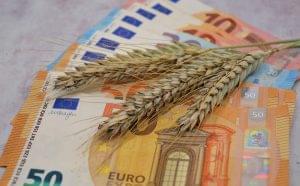Zsolt Feldman: 125,000 farmers have already received advances this year
By the end of November, 125,000 farmers had received an advance of about HUF 168 billion in the European Union’s agricultural support system, which has changed for this year compared to the previous one, the state secretary of the Ministry of Agriculture responsible for agriculture and rural development said on Tuesday in Keszthely.

(Photo: Pixabay)
Zsolt Feldman spoke at the agricultural forum of the Association of Zala County Farmers’ Associations about the fact that the payments still in progress will eventually reach HUF 270 billion in total. He indicated that due to the difficult market environment in agriculture, they are trying to make loans financeable with interest subsidies, which is also served by the latest construction of the Agrár Széchenyi Card. Today, nearly 80 percent of farmers’ loans are interest-subsidized schemes, the state secretary added. Zsolt Feldman said: the biggest change in agriculture this year was the application of the agro-ecology program (aöp), for which 30 percent of EU area-based subsidies, around 200 million euros, must be spent. 62,000 Hungarian farmers chose this option for 4.1 million hectares of the 5.1 million hectares of agricultural land. He also touched on the fact that the first amendment of the European Union’s Common Agricultural Policy Strategic Plan is now underway, after the regulation of the conditions and requirements of EU funds was created last year, but the change became necessary based on the experience of legislation and grant applications in the past year. This amendment will be adopted in January 2024, the biggest changes affect the practice of mowing lawn areas.
As the state secretary explained: now, if the farmers participating in the Aöp cannot fulfill their commitments, they will lose the full support
However, it was possible to achieve at least 30-50 percent of the support in case of partial fulfillment. Zsolt Feldman highlighted: in the last two years, Hungarian agriculture reached HUF 1,200 billion, of which HUF 750 billion was paid to rural development programs. Next year, the new application system will be launched, the basic aspect of which is to maintain continuity, so the first applications will be announced in February. He also mentioned that the duty-free appearance of Ukrainian agricultural products in Europe has completely changed the agricultural market environment. Due to the permanent presence of Ukrainian agriculture, Hungarian farmers also have to adapt, it is worth focusing on improving efficiency and growing more specialized field crops, for which there is a strong demand.
Balázs Győrffy, the president of the National Chamber of Agrarian Economy, believed that the agricultural companies operating in Ukraine are forced to sell
By the way, the largest such enterprises are in Saudi, Western European and mostly American hands. However, there is also a problem with Ukrainian grain, that it appeared not only in Hungary, but also in those markets where Hungarian farmers have sold so far, such as Italy, he added. The chamber president also reported that due to the increase in the administrative burden of farmers, the network of village farmers is being expanded by using the resources of the rural development program. Balázs Győrffy also touched on the experiences of the ice damage mitigation system, according to which in 2017, before the start of the system, farmers suffered ice damage on 72,000 hectares, but this year only 30,500 hectares. Over time, the system will be automated, because it is becoming increasingly difficult to find people to launch the missiles manually. He also reported a change with regard to game damage, as the chamber decided to set up a claims manager, which would take over the game damage of vulnerable farmers and settle it with those entitled to hunt instead. About HUF 3 billion is the annually compensated agricultural wildlife damage, but according to expert estimates, about HUF 21 billion would be justified – Balázs Győrffy argued. István Jakab, the vice-president of the Parliament and the president of MAGOSZ, emphasized that Hungary is not willing to leave a single cent of the money owed to it in the European Union budget. For this, it is also necessary to ensure that there are no errors in the submission of grant applications, and the expansion of the village farmer network is also for this, he said. He also spoke about how Russian agriculture benefited from the European embargo, because it received larger sums for improvements to increase the average yield. At the same time, in Ukrainian agriculture, they produce with a significant yield, namely with the most modern American machines, but MAGOSZ’s tests identified chemical substances that have long been banned in the European Union.
MTI
Related news
Rapeseed prices fell worldwide and domestically
🎧 Hallgasd a cikket: Lejátszás Szünet Folytatás Leállítás Nyelv: Auto…
Read more >ENAR data reconciliation for cattle, sheep and goat, pig and poultry farmers is underway until the end of March
🎧 Hallgasd a cikket: Lejátszás Szünet Folytatás Leállítás Nyelv: Auto…
Read more >Related news
(HU) METRO Gasztro Fesztivál a SIRHA Budapesten – Élmény, inspiráció és valódi megoldások a HoReCa-szakmának
🎧 Hallgasd a cikket: Lejátszás Szünet Folytatás Leállítás Nyelv: Auto…
Read more >Hétéves növekedési stratégiát jelentett be az Auchan
🎧 Hallgasd a cikket: Lejátszás Szünet Folytatás Leállítás Nyelv: Auto…
Read more >Protein, gut health and mental wellbeing – these trends will shape global food innovation in 2026
🎧 Hallgasd a cikket: Lejátszás Szünet Folytatás Leállítás Nyelv: Auto…
Read more >








